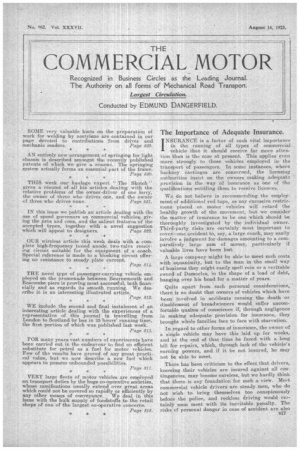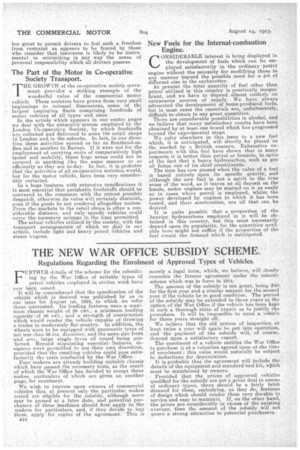The Importance of Adequate Insurance.
Page 1

Page 2

If you've noticed an error in this article please click here to report it so we can fix it.
INSURANCE is a factor of such vital importance in the running of all types of commercial vehicle thatit should receive far more attention than is the case at present. This applies even more strongly to those vehicles employed in the transport of passengers, In some instances, where hackney carriages are concerned, the licensing authorities insist on the owners making adequate provision in the wayof insurance as one of the qualifications entitling them to receive licences.
We do not believe in recommending the employment of additional red tape, as any excessive restrictions placed on motor vehicles will retard the he.althy, growth of the movement, but we consider the matter of insuranee to be one which should be thoroughly investigated by the individual owner. Third-party risks are certainly most important to cover—one accident to, say, alarge coach, may easily involve a lodgment for damages amounting to a comparatively . large sum of money, particularly if valuable lives have been lost, A large company might be able to meet such costs with equanimity, but to the man in the small way of business they might easily spell ruin or a veritable sword of Damocles, in the shape of a load of debt, hanging over his head for a matter of years.
Quite apart from such personal considerations, there is no doubt that owners of vehicles which have been involved in accidents causing the death or disablement of breadwinners would suffer uncomfortable qualms of conscience if, through negligence in making adequate provision for insurance, they brought whole families face to face with starvation. . In regard to other forms of insurance, the owner of a single vehicle may have this laid up for weeks, and at the end of that time be faced with a long bill for repairs, which, through lack of the vehicle's earning powers, and if. it be not insured, he may not be able to meet.
There has been criticism to the effect that drivers, knowing their vehicles are insured against all eon.. tingencies, may become careless, but we hardly think that there is any foundation for such a view. Mot commercial vehicle drivers are steady men, who do not wish -to bring themselves too conspicuously before the police, and reckless driving would certainly soon meet with • its inevitable penalty. The risks of personal danger in case of accident are also • B17 . too great to permit drivers to feel such a freedom from restraint as appears to be feared by those who consider that insurance is likely to be instrumental in minimizing in any way the sense of personal responsibility which all drivers possess.
The Part of the Motor in Co-operative Society Transport.
THE GROWTH of the co-operative society movement provides a striking example of the wonderful value of the commercial motor vehicle. These societies have grown from very small beginnings to colossal dimensions, some of the largest employing fleets comprising hundreds of motor vehicles of all types and sizes. In the article which appears in our centre pages we deal with the extensive eystem employed by the
London Co-operative Society, by which foodstuffs bee collected and delivered to some 18,0 retail shops in London and in the suburbs. Iii feet, in one direc tion these activities spread as far as Southend-on
ea and in another to Barnet, If it were not for the employment of carrying units of comparatively high
iipeed and mobility, these huge areas could not be
covered in anything like the same manner or so efficiently as they are to-day. In fact, it is probable
that the activities of all co-operative societies would, but for the motor vehicle, have been very considerably curtailed.
In a huge business with extensive ramifications it is most essential that perishable foodstuffs should be conveyed to the consumer with the utmost passible despatch, otherwise its value will certainly diminish, even if the goods be not rendered altogether useless. From the markets to the retail shops is often a considerable distance, and only speedy vehicles could cover the necessary mileage in the time permitted.
The actual vehicles utilized by the society, with the transport arrangements of which we deal in our, article, include light and heavy petrol vehicles and ' steam wagons.
New Fuels for the Internal-combustion Engine.
CONSIDERABLE interest is being displayed in the development of fuels which can be employed satisfactorily in the ordinary petrel engine without the necessity for modifying these in any manner beyond the possible need for a jet of different size in the carburetter. At present the total quantity of fuel other than petrol utilized in this country is practically insignificant, and we have to depend almost entirely on extraneous sources of supply. We have always advocated the development of .home-produced fuels, but in most eases the essentials are, unfortunately, difficult to obtain in any great quantities.
There are considerable possibilities in alcohol, and we believe that many satisfactory results have been obtained by at least one brand which has progressed beyond the experimental stage. • We refer elsewhere in this issue to a new fuel which, it is anticipated, will shortly he placed on the market by a. British concern. Exhaustive experiments with this fuel have shown that in many respects it is better than petrol or benzole, in spite of the fact that a heavy hydrocarbon, such as gas oil forms one of its chief constituents.
The time ha. now passed when the value of a fuel is based entirely upon its specific gravity, and although the new fuel is not a spirit in the true sense of the word, as it leaves an oil deposit on the hands, motor engines may be started on it as easily as in cases where petrol is employed, whilst the power developed by engines in which it has been -tested, and their acceleration, are all that can be desired. It is quite possible that a -proportion of the heavier hydrocarbons employed in it will be obtained in this country, but this must necessarily depend upon its popularity, for the quantities available here might not suffice if the properties of the fuel create the demand which is anticipated.




























